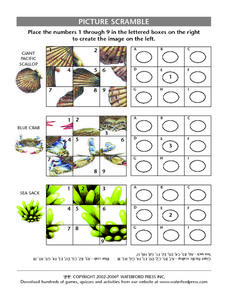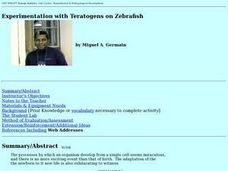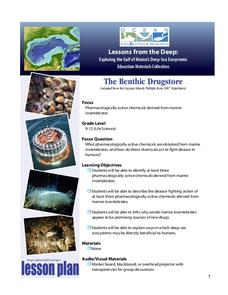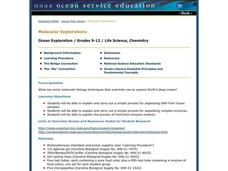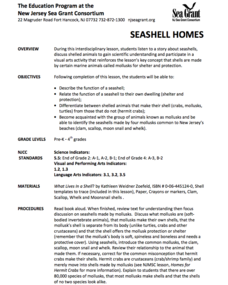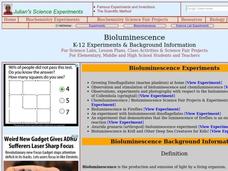Curated OER
Watch the Screen!
Students explore screening processes for biological activity. In this deep sea lesson plan students complete a lab activity.
Curated OER
Invasives and Macroinvertebrates
Students view macroinvertebrates, or discuss previous collection activity. They graph data on macroinvertebrates in the Hudson River. Students discuss the relationship between habitat, environmental changes, and invertebrate diversity or...
Curated OER
Picture Scramble: Giant Pacific Scallop, Blue Crab, Sea Sack
In this science and visual discrimination worksheet, students examine images of a giant pacific scallop, blue crab and sea sack. Next to each picture is the same image which has been divided into 9 pieces and scrambled. Students place...
Curated OER
Experimentation with Teratogens on Zebrafish
Students compare mitosis and meiosis with regard to chromosome number in parent cells versus daughter cells, types of cells produced, total number of cells produced, and the number of divisions. In groups, identify and differentiate the...
Curated OER
The Wonderful World of Slugs
Examine a slug? Of course, what else would a 2nd grader do with it? Pupils use clues and go on a slug hunt, read a slug story, or make a cooperative group mural of a slug's habitat. While older learners catalog slugs, go on a slug hunt,...
Curated OER
Vertebrates
Students identify and describe five main groups of the Phylum Chordata. They discover that the Phylum Chordata is the vertebrates. Students identify the main difference between invertebrates and vertebrates. They read passages about...
Curated OER
Dissolved Oxygen Lesson
Students investigate what dissolved oxygen is and why it is important to aquatic life and what factors influence levels of dissolved oxygen in a lake. They study how to use MS Excel to make charts to show trends and correlations.
McGraw Hill
Arthropods
Are spiders related to crabs? Study the order of arthropods with a reading selection about animal diversity. It provides details about each class within the order, as well as vivid pictures and explanatory charts.
Curated OER
What's Down There?
Investigate the coral reefs around Mokolai Island, Hawaii by researching and writing about improving the reef ecosystem. Students map threats to the ecosystem and use the list of key words to assist in their descriptions
NOAA
Importance of Deep-Sea Ecosystems – What Killed the Seeds?
Most drugs used today come from nature, so the discovery of new ecosystems in the deep sea is exciting from a medical perspective. Scholars develop their own bioassay to test germination rates in seeds.
Curated OER
Ocean Market
Students research how: The ocean is the source of many materials, from ores mined from its depths to relaxing mineral salts for a bath. Exquisite mother-of-pearl inlay, decorative shells, and pearl jewelry are found in gift shops...
NOAA
Importance of Deep-Sea Ecosystems – The Benthic Drugstore
You never know what you will find next in the deep sea ecosystem. So far, scientists have found items that work as anti-tumor agents, anti-inflammatory agents, agents that stop uncontrolled cell division, and much more. The lesson begins...
Curated OER
Clam Challenge
In this clams activity, students explore clam characteristics. Students complete nine multiple choice questions about clam facts.
Curated OER
Clam Vocabulary
In this clam vocabulary skills worksheet, students match the 9 clam-related terms in the word bank to the appropriate definitions.
Curated OER
Clam Crossword
For this clams crossword puzzle worksheet, students use the 10 clues and the terms in the word bank to help them correctly complete the word puzzle.
Curated OER
Architects of the Coral Reef
Students discuss reproduction in Cnidaria. in this coral reef lesson, students describe five characteristics of Cnidaria and compare and contrast the four classes. They describe the reproduction strategies they use.
Biology Junction
Mollusks
Mollusks created every shell on Earth. Young scientists learn more about the phyllum mollusca in an informative presentation. It covers their characteristics, body plans, and relationships in the ecosystem. Then, it details each class of...
Curated OER
Create a Hawaiian Tako Lure
Middle schoolers create a tako lure. In this Hawaiian culture lesson, students research how Hawaiians use natural resources to survive. Middle schoolers are introduced to new vocabulary and create an octopus lure.
Curated OER
Molecular Explorations
Students explain the processes for separating DNA from tissue and separating complex mixtures. In this exploratory lesson plan students complete a lab where they extract DNA.
Curated OER
The Electric Sieve
Students examine different mixtures and how they can be separated. For this electric sieve lesson students complete an activity that allows them to separate mixtures.
Curated OER
Seashell Homes
Pupils listen to a story about seashells. They discuss shelled animals. Learners describe the function of seashell. Pupils relate the function of a seashell to their own dwelling. They differentiate between shelled animals that make...
Curated OER
Japanese Scientists Photograph Giant Squid
Students read and discuss a news article about scientists capturing first-ever photos of a giant squid in its habitat. They answer comprehension questions, write a journal entry from the scientists point of view, and analyze a giant...
Curated OER
Bioluminescence
Students differentiate chemiluminescence from bioluminescence. In this biology lesson, students explain how fireflies and other animals emit light. They discuss the applications of engineered bioluminescence.
Curated OER
Sea Otters--Funny Mammals of the Sea
In this sea otters learning exercise, students read a 2 page article on sea otters, define 12 vocabulary words from the article and answer 7 comprehension questions in complete sentences.




